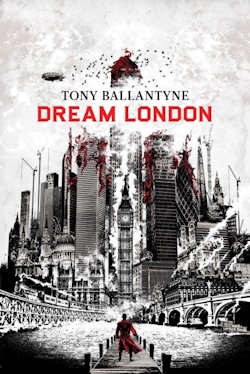From Tony Ballantyne’s Dream London:
There used to be an underground station opposite my building. Over the past year it had metamorphosed twice: first into a railway station, then into an inn. I remember the landlord holding court with his customers, telling us about the staircase leading down from his cellar into the tunnels through which the trains had once travelled. The tunnels had shrunk, he said, tightened like sphincters. What remained of those narrowed, fat-filled arteries was choked with black and green beetles, walking back and forth in long lines beneath the city, preyed on by silver snakes and cock rats.
A piece of writing like this is a lot more difficult to achieve than it might appear. We can all generate weirdness, but it’s a much harder thing to be able to generate weirdness that feels convincing and right.
Underground tunnels transmuting into ‘narrow, fat-filled arteries’ crammed with beetles, silver snakes and cock rats (whatever the latter may be) might seem pretty random, but has a strange and queasy resonance which mere randomness would never achieve.
This is a book about a London where, for reasons that are only slowly explained, the normal laws of the physical universe no longer apply, and a dream-like logic prevails. The key word here, though, is ‘logic.’ What Ballantyne has understood is that, while dreams may ignore the Newtonian principles that apply in waking life, they are not really random at all, but have a structure of their own based on metaphor and association. This allows him to make his strange Dream London into a place you feel you might have visited yourself, if only you’d been able to hold it in your mind when you woke up.
Ballantyne’s combination of humour, intelligence and deep darkness sometimes reminds me of Philip Dick at times, but it has a unique character all of its own. And Dream London (his sixth novel) doesn’t just build up a strange and compelling world, but sets an excellent story there too.
Chris Beckett’s short stories have been appearing in magazines and anthologies since 1990. His story collection, The Turing Test, won the Edge Hill Short Fiction Award in 2009, from a shortlist that included collections by Booker Prize winner Anne Enright and Whitbread Prize winner Ali Smith. His novel, Dark Eden was recently rereleased by Crown Publishing. Its sequel, Mother of Eden, will be released in August 2014.










